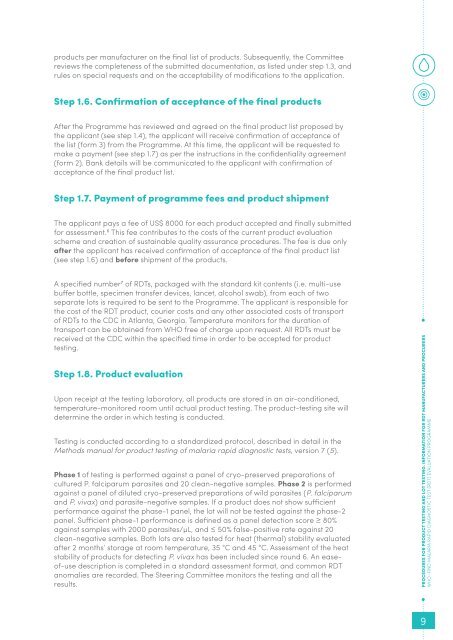WHO-2015_Procedures-malaria-RDT-productlot-testing
WHO-2015_Procedures-malaria-RDT-productlot-testing
WHO-2015_Procedures-malaria-RDT-productlot-testing
Create successful ePaper yourself
Turn your PDF publications into a flip-book with our unique Google optimized e-Paper software.
products per manufacturer on the final list of products. Subsequently, the Committee<br />
reviews the completeness of the submitted documentation, as listed under step 1.3, and<br />
rules on special requests and on the acceptability of modifications to the application.<br />
Step 1.6. Confirmation of acceptance of the final products<br />
After the Programme has reviewed and agreed on the final product list proposed by<br />
the applicant (see step 1.4), the applicant will receive confirmation of acceptance of<br />
the list (form 3) from the Programme. At this time, the applicant will be requested to<br />
make a payment (see step 1.7) as per the instructions in the confidentiality agreement<br />
(form 2). Bank details will be communicated to the applicant with confirmation of<br />
acceptance of the final product list.<br />
Step 1.7. Payment of programme fees and product shipment<br />
The applicant pays a fee of US$ 8000 for each product accepted and finally submitted<br />
for assessment. 6 This fee contributes to the costs of the current product evaluation<br />
scheme and creation of sustainable quality assurance procedures. The fee is due only<br />
after the applicant has received confirmation of acceptance of the final product list<br />
(see step 1.6) and before shipment of the products.<br />
A specified number 7 of <strong>RDT</strong>s, packaged with the standard kit contents (i.e. multi-use<br />
buffer bottle, specimen transfer devices, lancet, alcohol swab), from each of two<br />
separate lots is required to be sent to the Programme. The applicant is responsible for<br />
the cost of the <strong>RDT</strong> product, courier costs and any other associated costs of transport<br />
of <strong>RDT</strong>s to the CDC in Atlanta, Georgia. Temperature monitors for the duration of<br />
transport can be obtained from <strong>WHO</strong> free of charge upon request. All <strong>RDT</strong>s must be<br />
received at the CDC within the specified time in order to be accepted for product<br />
<strong>testing</strong>.<br />
Step 1.8. Product evaluation<br />
Upon receipt at the <strong>testing</strong> laboratory, all products are stored in an air-conditioned,<br />
temperature-monitored room until actual product <strong>testing</strong>. The product-<strong>testing</strong> site will<br />
determine the order in which <strong>testing</strong> is conducted.<br />
Testing is conducted according to a standardized protocol, described in detail in the<br />
Methods manual for product <strong>testing</strong> of <strong>malaria</strong> rapid diagnostic tests, version 7 (5).<br />
Phase 1 of <strong>testing</strong> is performed against a panel of cryo-preserved preparations of<br />
cultured P. falciparum parasites and 20 clean-negative samples. Phase 2 is performed<br />
against a panel of diluted cryo-preserved preparations of wild parasites (P. falciparum<br />
and P. vivax) and parasite-negative samples. If a product does not show sufficient<br />
performance against the phase-1 panel, the lot will not be tested against the phase-2<br />
panel. Sufficient phase-1 performance is defined as a panel detection score ≥ 80%<br />
against samples with 2000 parasites/μL, and ≤ 50% false-positive rate against 20<br />
clean-negative samples. Both lots are also tested for heat (thermal) stability evaluated<br />
after 2 months’ storage at room temperature, 35 °C and 45 °C. Assessment of the heat<br />
stability of products for detecting P. vivax has been included since round 6. An easeof-use<br />
description is completed in a standard assessment format, and common <strong>RDT</strong><br />
anomalies are recorded. The Steering Committee monitors the <strong>testing</strong> and all the<br />
results.<br />
<strong>Procedures</strong> for product <strong>testing</strong> and lot <strong>testing</strong>. Information for <strong>RDT</strong> manufacturers and procurers<br />
<strong>WHO</strong>–FIND Malaria Rapid Diagnostic Test (<strong>RDT</strong>) Evaluation Programme<br />
9


